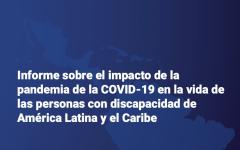On February 9, the Latin American Network of Non-Governmental Organizations of Persons With Disabilities and their Families (RIADIS), the International Disability Alliance (IDA) along with the Sustainability Center of the Universidad de Lima organized a webinar to present the Report on the Impact of COVID-19 Pandemic on the lives of Persons with Disabilities in Latin America and the Caribbean.
 The report details the impact of the pandemic on persons with disabilities and identifies gaps in public policies and humanitarian actions of governments and other institutions involved. The report can be used as a tool to respond to the current situation and future emergencies in a truly inclusive way.
The report details the impact of the pandemic on persons with disabilities and identifies gaps in public policies and humanitarian actions of governments and other institutions involved. The report can be used as a tool to respond to the current situation and future emergencies in a truly inclusive way.
The welcome remarks of the webinar were given by Juan Ángel de Gouveia, President of RIADIS; then Enrique Bonilla, Director of the School of Architecture of the University of Lima and Vanessa García, Head of Social Responsibility of the Sustainability Center, that was followed by opening remarks by José María Viera, Director of Advocacy, IDA focused on how this report will become necessary fuel to bring public policies to a space of greater inclusion and sustainability. In this regard, he stressed the importance of working under universal design and accessibility as a long-term goal to eliminate the barriers faced by persons with disabilities.
Vanessa Zadel, Academic Secretary, Architecture School of the University of Lima explained that the research process was carried out in 2 phases including a survey at the regional level and 8 focus groups. The survey was prepared by RIADIS, IDA and Humanity & Inclusion (HI).
Further, Alfredo Estrada, director of the Sustainability Center, University of Lima explained the impact of sustainability in the community of people with disabilities. While presenting the findings of the report, Rosa María Juárez, Coordinator of the Network for Inclusive Management of Disaster Risk and Disability in Latin America and the Caribbean (GIRDD-LAC Network) explained how COVID-19 pandemic has hit the entire continent hard, particularly persons with disabilities. The findings include evidence of a structural discrimination of persons with disabilities which has led to a considerable regression in the achievements of their rights.
The event was concluded with remarks from Juan Ángel de Gouveia, President of RIADIS who recalled that the pandemic showed us that support to persons with disabilities must be done in a transversal way to ensure that all emergency and recovery plans are inclusive. “We seek that this report makes an impact on local, national and international authorities, resulting in the true inclusion of people with disabilities,” he added.
The accessibility of the webinar included International Sign Language (ISL), subtitling and simultaneous English interpretation.
Read the full report in Spanish here
